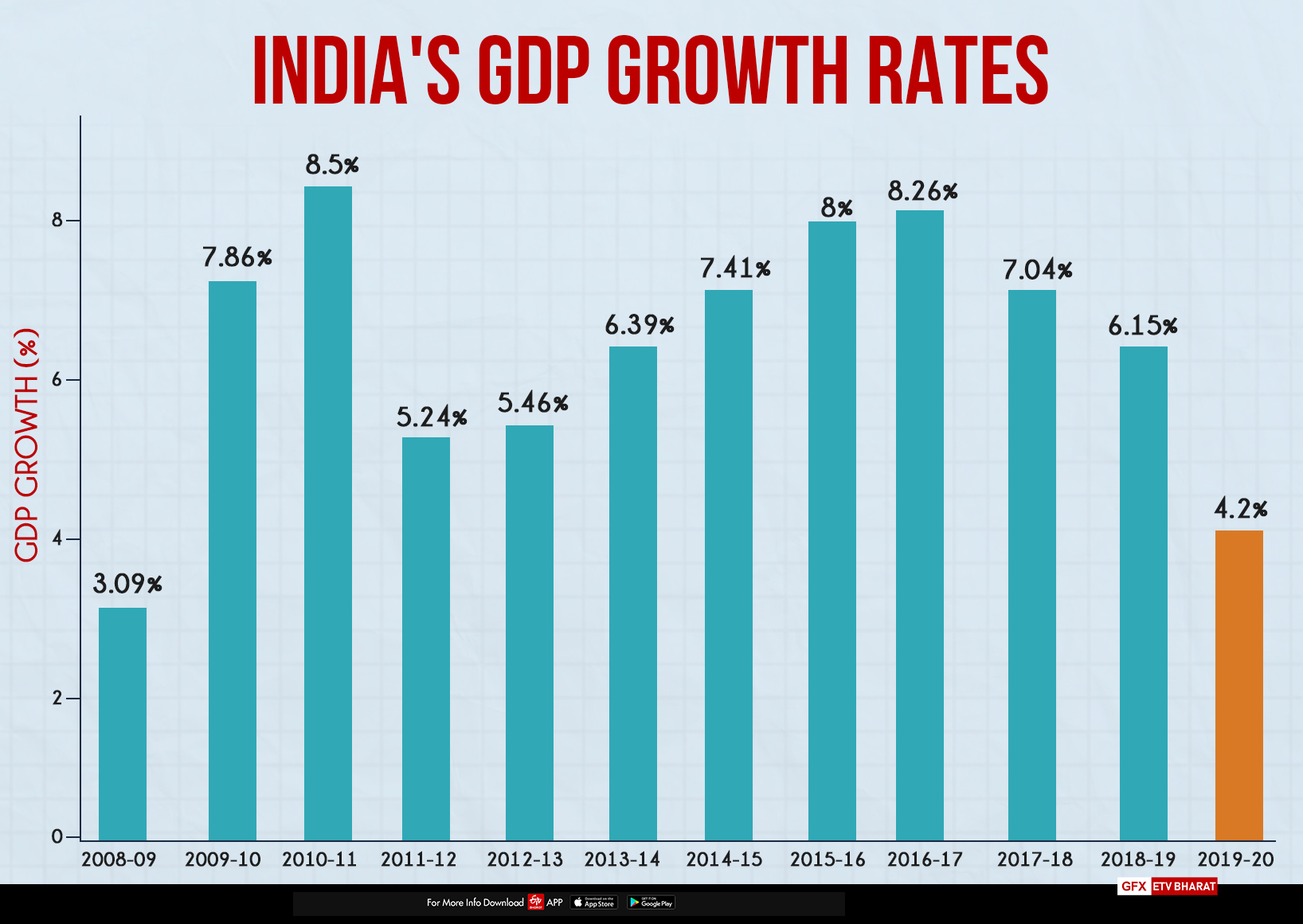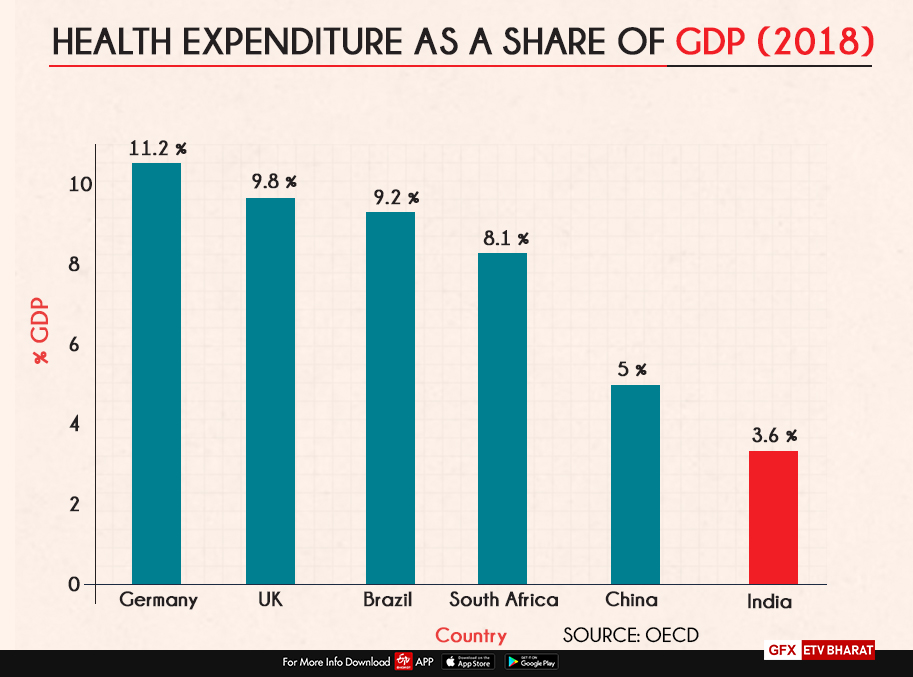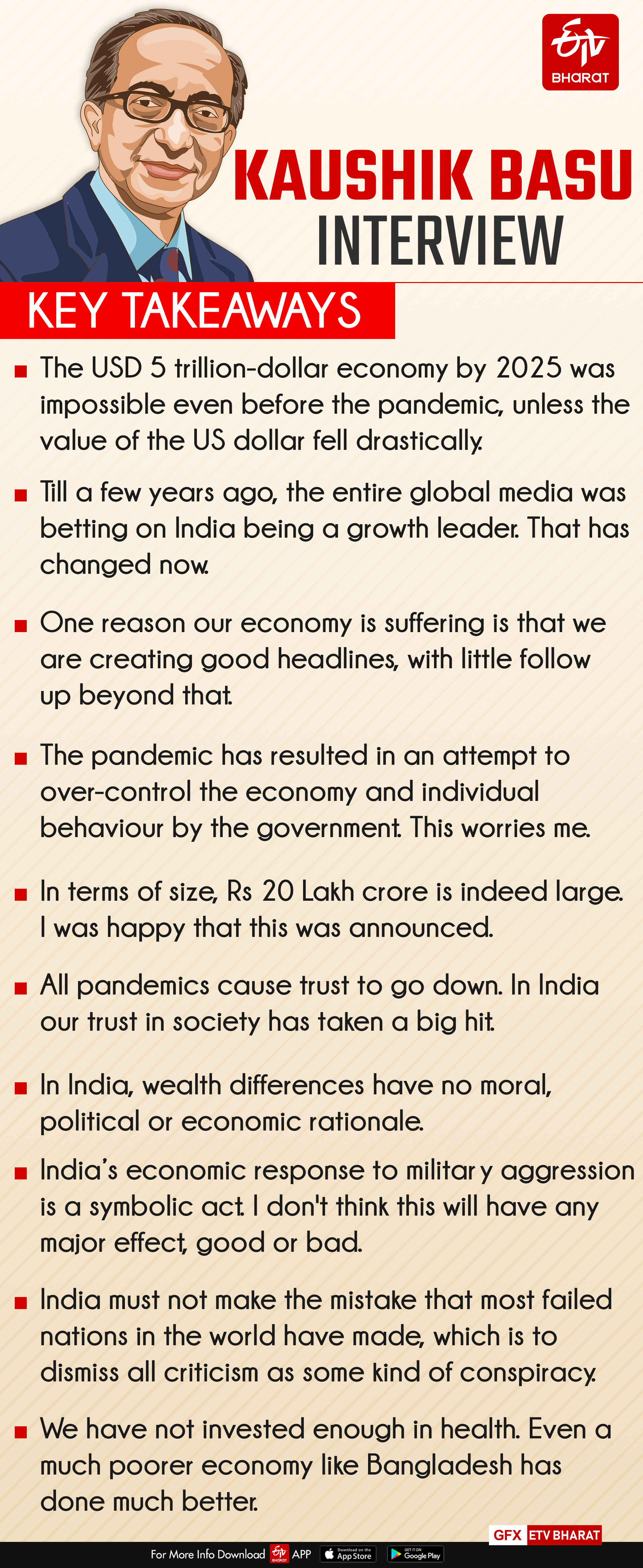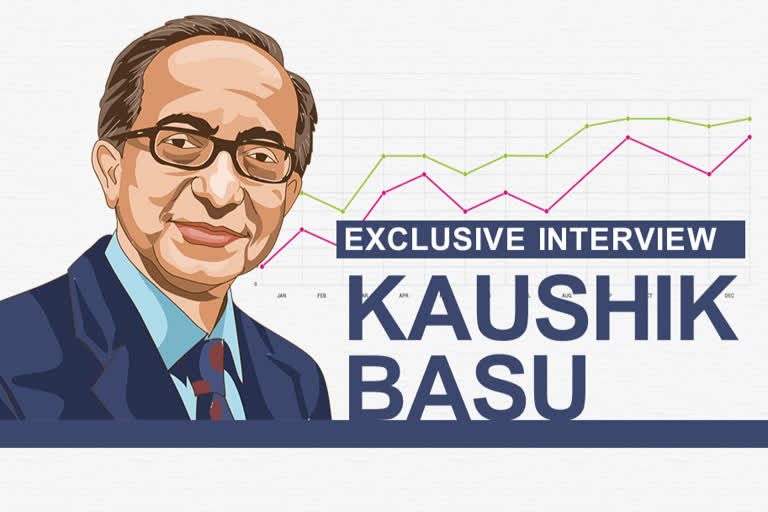Hyderabad: India’s GDP growth rate in 2020 will be below the -5.2% seen in 1979, which will make this the slowest growth recorded since independence opined Prof Kaushik Basu.
Expressing concern over rise in divisive politics and the tendency to push back on science, Basu cautioned that India must not make the mistake that most failed nations in the world have made, which is to dismiss all criticism as some kind of conspiracy.
Prof Kaushik Basu was Chief Economist of the World Bank from 2012 to 2016. He also served as the Chief Economic Adviser to the Union Government. At present, he is a Professor of Economics at the Cornell University, USA.
INTERVIEW:
India's GDP growth rate in 2019-20 slipped to 4.2%. This is the slowest pace in 11 years. Several rating agencies have predicted the Indian economy to contract between 3 and 5 % in the current financial year. On the other hand, COVID infections are rising faster than ever. What is your assessment on the extent of the economic crisis we are facing? How bad is this crisis?
The economic situation in India is very worrying. A part of the slowdown is understandable because the COVID-19 pandemic has caused a slowdown all over the world. But a general slowdown should not cause a country’s rank to change.
What we are seeing in recent times is India is dropping down on almost all global rankings.
In the ranking announced every week by the Economist Intelligence Unit of the Economist magazine for 43 major economies, India was among the top 3 fastest-growing economies for several years. It has now dropped to 23rd rank.
India’s sharp slowdown had begun two years before the pandemic and the way the lockdown was executed has given a further downward jolt to the economy.

India’s unemployment rate jumped to over 20% after the lockdown, which is among the highest anywhere in the world.
As an Indian citizen wanting India to succeed, I feel disappointed by this.
I have disagreement with the government on political matters, but, despite that, my expectation was this government would deliver on economic growth. Hence, India’s performance has been a great disappointment to me.
In terms of fundamentals and the talent inside the country, India has the ability to be the world’s fastest-growing country. But we are going the opposite way. It is now beginning to look likely that in 2020 India’s growth will be below the -5.2% growth seen in 1979, which will make this the slowest growth recorded since independence.
How do you assess the central government's Rs 20 lakh crore economic relief package? Will it give necessary stimulus to the economy?
In terms of size, Rs 20 lakh crore is indeed large. I was happy that this was announced. Properly used, it can do a lot of good.
There is a strong argument that there is no adequate and direct income support for the needy people in the package. What is your view on it?
That is a valid criticism. The need amidst this crisis is to get money into the hands of the poor immediately. This should be done on a war-footing. Unfortunately, we are not seeing such policy action.
For that reason, when I say that I am glad that the 20 lakh crore package was announced, I should add that I am at the same time worried that it will largely be left as a good headline, without adequate follow-up action.
One reason our economy is suffering is that we are creating good headlines, with little follow up beyond that.
In your view what the government should have done to protect the economy? How long do you expect the economic effects of COVID-19 will continue?
In retrospect, the lockdown was very poorly executed and that has slowed the economy more than we need to have and also caused the virus to spread.
India’s lockdown was among the most severe in the world. I was pleased when this happened and was sure that the government must have detailed plans of supporting policies to handle the lockdown.
You have to have plans on how to handle workers who would be left without work. You need policies to make sure supply chains do not break down. You also need plans to build hospital facilities and medical testing centres very quickly. Otherwise at the end of the lockdown, you have achieved very little. That is what happened in India.
It soon became clear that there was no evidence of these supporting policies. Workers were left without jobs, huddled together. Then when they began to walk home, the virus began to spread.
The pandemic has been much less severe in all of Asia and Africa. But within this region, one of the worst performances has been that of India, where the virus has continued to grow rapidly ever since the time of the lockdown. This could have been avoided.
How long this will last depends partly on how long the pandemic continues. On that I have no special knowledge.
Read more:U, V, W, L, Z or swoosh? Various shapes of economic recovery explained
As far as its economic effects go, India stands at the crossroads. In terms of fundamentals, India is extremely strong—with good higher education, a research sector that was becoming very strong, and huge strengths in the information technology sector. But we are making so many policy mistakes that there is a genuine risk that despite these strengths the economy will weaken.
The pandemic has resulted in an attempt to over-control the economy and individual behaviour by the government. This worries me.
India has a long history of license permit raj. A system of permissions and excessive bureaucratic control, as we used to have, is bad enough. But a system of permissions with excessive political control can be even more damaging.
Most migrant workers have gone to their villages. They would not return to cities in near future as infections are raising day by day. This situation will have adverse effect on both urban and rural economies. How to tackle this issue?
This is a problem that never should have occurred. This was caused by the lack of supporting policies with the lockdown. All pandemics cause trust to go down. In India our trust in society has taken a big hit.
We have to use a combination of monetary and fiscal policies to boost demand and rebuild trust and confidence in our institutions.
In a recent interview you have said 'Inequality in India already very high. This is worrying. My fear is that Corona pandemic will cause inequality to rise'. Really this is a serious issue. How to address this problem?
India’s inequality is unacceptably high. An OXFAM study of a year ago shows 1% of India owns 73% of the nation’s wealth. As an economist I am aware that there will be economic inequality and some of it is in fact needed to create incentives, but we do not need inequality at this shockingly high level.
In a nation where we still have millions of people living below the poverty line, such great wealth differences have no moral, political or economic rationale.
I feel the pandemic is going to speed up the advance in digital technology. In itself this is good news. But we must have a policy to make sure that its benefits are not all collected by a small elite.
As a nation we have a dream of becoming USD 5 trillion economy by 2025. But now due to this epidemic we have come to know how weak our public health system is. We are spending a mere 3.6% of GDP on the health sector, which is very low. Developed nations like UK is spending 9.8% and Germany is spending 11.1%. Is it possible to any country to attain great economic development without proper investment in the health sector?
The USD 5 trillion-dollar economy by 2025 was impossible even before the pandemic, unless the value of the US dollar fell drastically. But even with a more realistic target, you are right—we do need much greater investment in health.

This has been a long-run problem with India and goes back several decades to failures by previous governments. We have not invested enough in health. Even a much poorer economy like Bangladesh has done much better, and now Bangladeshis have a life expectancy that is 3 years more than that of Indians.
Now India is trying to reduce the imports from China as a part of an economic response to Chinese aggression in Ladakh. Can Indian manufacturing sector benefit from it?
This is a symbolic act. I don't think this will have any major effect, good or bad.
Some people from industry saying that if the government makes industrial policies according to the new situation, several big foreign companies will shift their investments from China to India. Will this happen in reality?
India has huge scope for attracting global capital. This relates to what I was saying earlier. India has fundamental strengths, which could attract global capital and put India on top of the global list in terms of growth. But we are showing so little professionalism in policymaking and there is such a rise in political control over markets and firms that the opposite seems to be happening.
Last March India saw a capital outflow of 16 billion dollars—the largest outflow in one month. The capital that is leaving China is flowing into Vietnam, Mexico and other nations and negligibly into India.
It is not too late for India. We have to give a signal of being a modern nation that has professional policymaking, values science and engineering, nurtures trust among citizens instead of hatred across groups.
The positive role that trust plays in promoting growth is now well-recorded. India is unfortunately seeing a retreat on this front.
What are the changes you are expecting in global economic order after Corona?
The global economic landscape is going to change a lot. I think there is going to be a sharp rise in the use of digital technology and a lot of advance in the information technology sector.
I expect the health sector to become much larger—more hospitals, better medicine, new research into medicine and healthcare, wider provision of healthcare for the people. IT and healthcare are two sectors where India has a natural strength. I don't have to tell you this.

Your region—Telangana, Andhra Pradesh and Karnataka are in the frontline in these sectors.
But to capitalize on these strengths and develop, we have to put India’s political house and institutions in order.
Till a few years ago, the entire global media—newspapers, magazines and TV--were betting on India being a growth leader. That has changed now.
There is a lot of concern being expressed all over the world about India, in particular, the rise in divisive politics and the tendency to push back on science and to resist questioning and criticism. We have to give this thought and discuss and how we can do better.
India must not make the mistake that most failed nations in the world have made, which is to dismiss all criticism as some kind of conspiracy.


